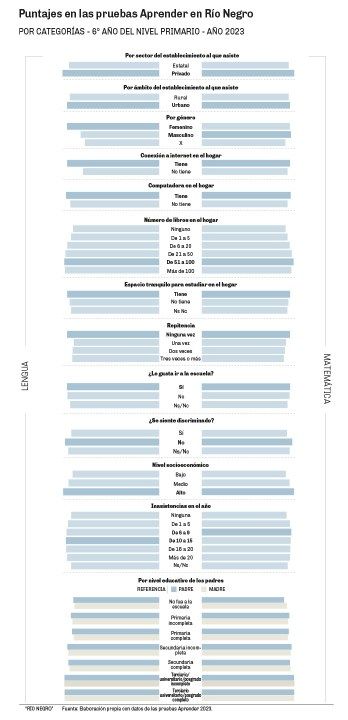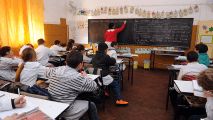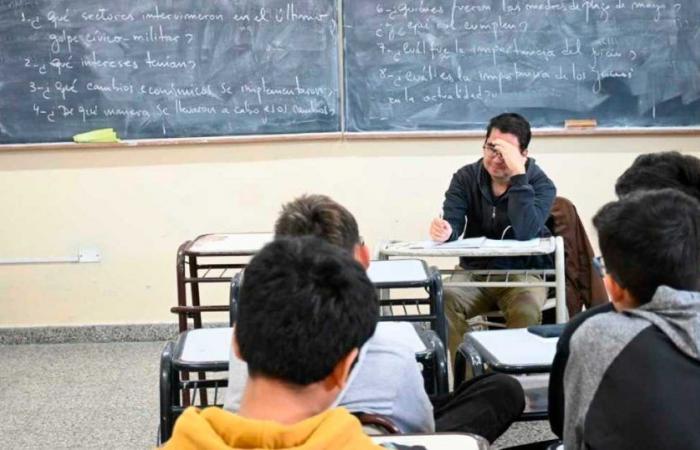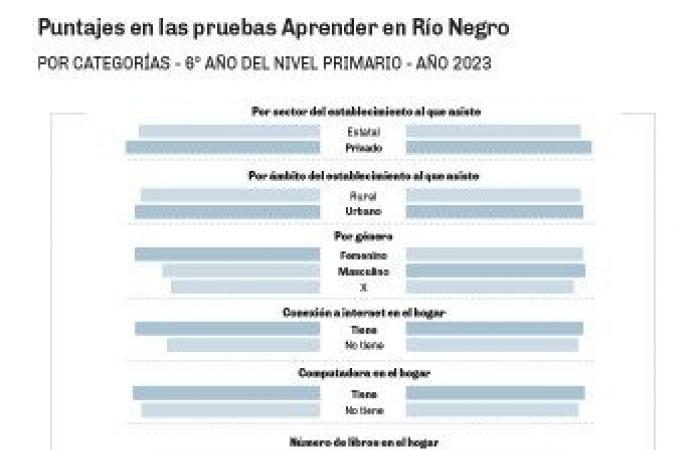The results of the latest Learn evaluations, carried out on sixth-year primary school students from all schools in the country, show a deterioration in educational performance compared to the operations carried out in previous years. The province of Río Negro recorded scores close to the national average in mathematics, and above the average in language.
The tests were carried out in September 2023, and the results report was prepared and published recently the Ministry of Education, dependent on the Ministry of Human Capital.
The scores reported are based on an arbitrary scale and do not alone measure how much students know. However, they are useful for comparison. Therefore, in this note we show How the average scores vary in the province of Río Negro according to selected characteristics of the students, the establishment they attend and the home to which they belong.
Are performances better in state-run or privately run establishments? Did students who like going to class do better than those who don’t? At what socioeconomic level are the highest scores observed? Those are some questions that we will answer here, based on the data processing carried out by Diario RÍO NEGRO.
In the questionnaires, students were asked to mark only one option. We decided to condense into “does not know/does not answer” (NS_NC) those cases in which the student did not mark any option and the cases in which she marked more than one. Furthermore, all observations with missing data were eliminated. Total, The responses of 9,564 students in the province were processed.
Scores for establishment characteristics
Of the total number of students in Río Negro who were in the sixth year of primary school in 2023 (hereinafter, simply “students” or “students”), 78.1% attended state-run establishmentsand the remaining 21.9% did so in privately managed establishments.
The data show that Students who were part of the private education sector have shown significantly better performance than those who attended public schools. The differences are observed in mathematics and, above all, in language. This is illustrated in the attached infographic.

The possible underlying factors are diverse; for example, the socioeconomic level of the family, and the material support tools they have at home. Irene Kit, pedagogue and representative of Argentinos por la Educación, added that In the private education regime “there are many more chances of team agreement.”in the sense that the director or legal representative is free to hire people.”
Nine out of ten students in Río Negro attended establishments located in urban areas, while one in ten attended rural schools. In the first group, the language scores are higher than in the second. In mathematics, however, there are practically no differences.
Scores by student characteristics
50% of the students surveyed in the province correspond to women, 49% to men, and 1% to non-binary gender. The results of the Learn tests show that women perform better than men in language. On the other hand, men obtained better scores than women in mathematics.
“It’s practical, it’s not genetics,” noted Kit, and explained that “Women tend to perform better than men in oral communication. and in written language acquisition in the early grades, and In the case of men there is a cultural issue towards games and activities that require spatial managementcalculation, speeds, interactions between objects and so on, which makes mathematics easier for them.”
Women perform better than men in language. On the other hand, men obtained better scores than women in mathematics.
Those who identified with non-binary gender have obtained considerably lower scores than women and menmainly in mathematics.
Students were also asked if they feel discriminated against. A first fact to highlight is that 58% of the responses correspond to “does not know/does not answer”. In no other processed question was such a high percentage observed in that category.
28.7% of students indicated that they did not feel discriminated against, while 13.3% said the opposite. The other fact that should be highlighted is that the scores in the first group are significantly higher than those in the second: the educational performance of students who feel discriminated against is worse.
“When a person is in an unsafe environment, in which they feel threatened, the brain decodes that negative stimulus as a risk to life, then clearly they are not going to pay attention to the learning situation.”
Irene Kit, pedagogue and representative of Argentinos por la Educación.
“When a person is in an unsafe environment, in which they feel threatenedthe brain decodes that negative stimulus as a risk to life, then it is clearly not going to pay attention to the learning situation,” Kit said.
Those students who like going to school did better in math than those who said they don’t like it.. In language, however, there are almost no differences in average performance between both groups.
A striking fact is that those students who, until September 2023, had never missed classes during the year obtained lower scores than those who registered absences. Understanding this paradoxical result requires investigating the causes of greater or lesser absenteeism..
Students who had never repeated a year (93.2% of the total) showed better performance than those who repeated at least once.
Scores for home characteristics
78.7% of the students surveyed in the province were classified as having a medium socioeconomic level, 15.9% as having a high level, and 5.4% as having a low level. Scores on the Learn assessments show differences depending on the student’s socioeconomic status.
The educational performance of students from a low socioeconomic level is below that of those from a medium level, and that of the latter, in turn, is lower than that from a high level. The differences are more marked in language than in mathematics.
“There is talk of the ‘cradle effect’, that is to say that those who are better off in the socioeconomic level generally have a cultural capital similar to that which is installed in school as the desired cultural capital.“explained the specialist.
“There is talk of the ‘cradle effect’, that is to say that those who are better off in the socioeconomic level generally have a cultural capital similar to that which is installed in school as the desired cultural capital.”
Irene Kit, pedagogue and representative of Argentinos por la Educación.
Linked to this aspect, the students were asked if they have an internet connection and computers at home. Those who have an internet connection (92.7% of the total) obtained better scores in the tests than those who do not have one. Besides, two out of three students said they had a computer at home, and they showed better performance than those students who do not have one..
As far as the home educational environment is concerned, It is interesting to note that the more books there are in your home, the better the student’s performance.. The gaps are more pronounced in language than in mathematics. “It is a proxy for the sociocultural capital of the family.”Kit noted. 11% of Río Negro students said that there are no books at home.
It has been shown that the educational level of parents is positively correlated with the academic performance of their children. This is evident in the data we analyzed. The performance of those students whose parents did not go to school is worse than that of those whose parents have primary education (complete or incomplete). The average score of the latter is, at the same time, lower than that of those with parents with secondary education (complete or incomplete). Finally, it is worth noting that students whose parents have completed tertiary, university or postgraduate studies are those who obtained the highest scores in the Learn assessments.
The gaps in language are greater when considering the educational level of the motherwhile in mathematics the differences widen if the scores are crossed with the father’s educational level.
Another element to highlight is that students who say they have a quiet space to study at home had better scores than those who do not have.










